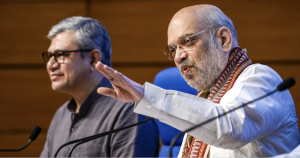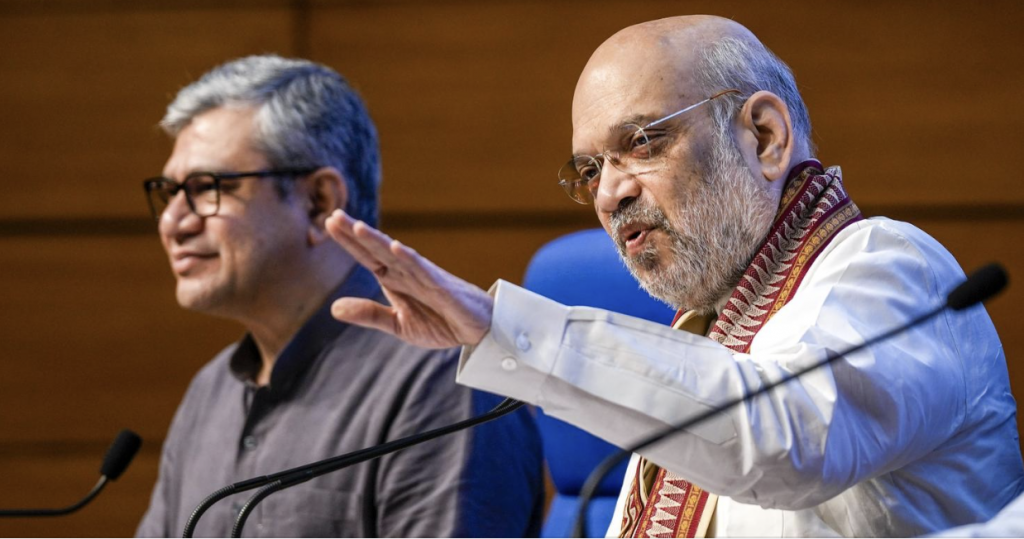NEW DELHI, Sept 17: Amit Shah Home Minister on Tuesday said the BJP-led NDA Government will implement the ‘one nation, one election’ within its current tenure.
Addressing a press conference here to mark the 100 days of the third consecutive term of Prime Minister Narendra Modi, Shah said, “We plan to implement one nation one poll within the tenure of this governmentShah was flanked by I&B Minister Ashwini Vaishnaw at the press conference.
In his Independence Day address last month, the Prime Minister made a strong pitch for ‘one nation, one election’, contending that frequent polls were creating hurdles in the country’s progress.
“The nation has to come forward for ‘one nation, one election’,” Modi had said in his address from the ramparts of the Red Fort.
One nation, one election’ is one of the key promises made by the BJP in its manifesto for the Lok Sabha elections.
A high-level panel headed by former president Ram Nath Kovind in March this year recommended simultaneous elections for the Lok Sabha and state assemblies as the first step followed by synchronised local body polls within 100 days.
Separately, the Law Commission is likely to recommend holding simultaneous polls for all three tiers of Government — Lok Sabha, state assemblies and local bodies like municipalities and panchayats — starting in 2029 and a provision for a unity Government in cases such as a hung house or when a no-confidence motion is passed.
The Kovind panel has not specified any period for rolling out simultaneous polls.
It has proposed creation of an ‘Implementation Group’ to look into the execution of the panel’s recommendations.
The panel recommended as many as 18 constitutional amendments, most of which will not need ratification by the state assemblies.
However, these would require certain Constitution amendment bills that would need to be passed by Parliament.
Meanwhile, Home Minister Amit Shah said that the government will “very soon” make an announcement for carrying out the census in the country.
“We will announce it very soon,” Shah said in response to a question on conducting the decadal census of the Indian population which has been delayed due to the COVID-19 pandemic.
Shah, along with I&B Minister Ashwini Vaishnaw, was addressing a press conference to mark the 100 days of the third tenure of the NDA government led by Prime Minister Narendra Modi.
“We will make all the details public when we announce the census,” the Union home minister said to questions on the caste census.
India has conducted the census every 10 years since 1881.
The first phase of this decade’s census was expected to begin on April 1, 2020 but had to be postponed due to the COVID-19 pandemic.
Shah’s comments on the census comes amid vociferous demands political parties on conducting a caste census.
In the absence of fresh data, the government agencies are still formulating policies and allocating subsidies based on the data of the 2011 census.
The house listing phase of the census and the exercise to update the National Population Register (NPR) were scheduled to be carried out across the country from April 1 to September 30, 2020 but it was postponed due to the Covid outbreak.
The entire census and the NPR exercise is likely to cost the government more than Rs 12,000 crore, according to officials.
This exercise, whenever it happens, will be the first digital census giving the citizens an opportunity to self-enumerate.
The NPR has been made compulsory for the citizens, who want to exercise the right to fill the census form on their own rather than through government enumerators.
For this, the census authority has designed a self-enumeration portal, which is yet to be launched.
During self-enumeration, Aadhaar or mobile number will be mandatorily collected.
The Office of the Registrar General and Census Commissioner had prepared 31 questions to be asked. Those questions include whether a family has a telephone, internet connection, mobile or smartphone, bicycle, scooter or motorcycle or moped, whether they own a car, jeep or a van.
The citizens will also be asked what is the cereal they consume in the household, main source of drinking water, main source of lighting, access to toilet, type of toilet, waste water outlet, availability of bathing facility, availability of kitchen and LPG/PNG connection, main fuel used for cooking, availability of radio, transistor, television.
The citizens will also be asked about the predominant material of the floor, wall and roof of the house, condition of the house, total number of persons normally residing in the household, whether the head of the household is a woman, whether the head of the household belongs to the Scheduled Caste or Scheduled Tribe, number of dwelling rooms exclusively in possession of the household, number of married couple(s) living in the household among others.


